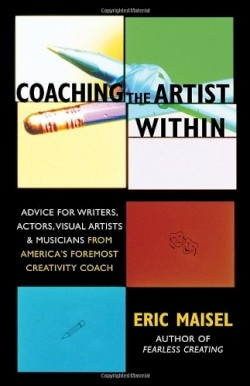Coaching the Artist Within
Advice for Writers Actors Visual Artists & Musicians from America&8217;s Foremost Creativity Coach
“I write my first sentences without any expectation at all,” says the author. “Thinking how the mightiest river begins somewhere with a tiny, uncertain trickle, I’m unconcerned when my first sentences don’t seem to roar.”
This is one simple strategy suggested by the author to help the reader (in this case, the struggling writer) to create in the middle of the sometimes overwhelming craziness and busyness of regular life. This volume is actually a workbook of sorts, a compilation of twelve skills, each accompanied by supporting exercises and a reflective anecdote, for any individual with a creative disposition.
Maisel, who holds degrees in philosophy, creative writing, psychology, counseling, and counseling psychology, is a licensed family therapist and faculty member of St. Mary’s College in Moraga, California. He has written a number of self-help books, such as The Van Gogh Blues: The Creative Person’s Path Through Depression and Affirmations for Artists.
He states that his idea of creativity coaching, “the activity of one person helping another with the psychological, emotional, existential, and practical problems that arise as he or she tries to create,” is a profession only in its infancy.
Throughout his book, he offers advice on becoming one’s own creativity coach, such as making sure that passion is inherent in creating, whether it’s writing, acting, composing, or drawing. Writing a life purpose statement is one of the earliest exercises Maisel suggests, along with putting together a creativity kit, which should include a daily calendar, project log, and to-do list pad for recording only artistic goals, not tasks like “take the cat to the vet or renew car insurance.” Breathing techniques, positive self-talk, and becoming an anxiety expert, including recognizing when there is procrastination at work, are all addressed.
The author takes common-sense ideas and puts them down in a way that most readers, and artistic personalities, will understand and want to follow through on. The anecdotes that close each chapter, such as the ones about the rock band bass player and Helga from Iceland, are wonderful little stories that could stand alone if they weren’t reflecting back on a previous topic.
Maisel realizes that most people aren’t able to create because of the constant pressures of everyday life around them. With the skills presented here, creative people can discover the correct solution to that problem for themselves, because, as Maisel admonishes, “You must be able to create in the middle of things, or else you will not create.”
Disclosure: This article is not an endorsement, but a review. The publisher of this book provided free copies of the book to have their book reviewed by a professional reviewer. No fee was paid by the publisher for this review. Foreword Reviews only recommends books that we love. Foreword Magazine, Inc. is disclosing this in accordance with the Federal Trade Commission’s 16 CFR, Part 255.

